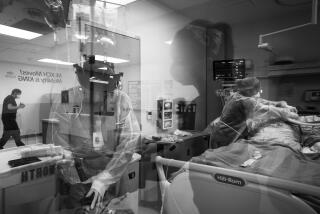PTSD-stricken veterans may be at higher risk for heart disease

- Share via
Experts expect that 400,000 or more U.S. veterans of the wars in Afghanistan and Iraq will suffer from PTSD at some point. A new study suggests that they’ll have more to worry about than a debilitating psychiatric condition — they could also be at much greater risk for heart disease, the nation’s leading cause of death.
In research published online Tuesday in the Journal of the American College of Cardiology, scientists studying a group of male twins who served in the military during the Vietnam era — 1964 to 1975 — found that a diagnosis of PTSD more than doubled the likelihood that they would go on to develop heart disease.
It wasn’t just that veterans with PTSD smoked more and exercised less, though they did. The researchers controlled for those and other well-established influences on cardiovascular health.
“It’s not explained by lifestyle changes that are common among people with PTSD,” said Dr. Charles Marmar, a psychiatrist and PTSD expert at New York University who was not involved in the study. “That’s very surprising.”
He praised the work, saying that it strongly suggested that PTSD symptoms caused the increased risk.
By conducting the research in twins, the scientists were also able rule out the possibility that genetics, upbringing or environmental factors in childhood might be major contributors to the link between PTSD and heart disease.
The men belong to the Vietnam Era Twin Registry — a research pool of about 7,000 pairs of twins, all of them male veterans. It was created by the Department of Defense in the late 1980s to investigate the effects of exposure to Agent Orange, an herbicide used to clear dense jungle during the war. But the registry has since been used by epidemiologists to study a variety of mental and physical conditions.
In the latest study, a team led by researchers at Emory University in Atlanta used a variety of criteria to select 281 twin pairs from the registry. Some had been to Vietnam and saw combat, while others had never left the U.S.
All 562 men had been assessed for PTSD in 1992; 137 of them were found to have it, most commonly stemming from the war, though in some cases from other types of trauma. None had reported having heart disease when they joined the registry between 1987 and 1992.
Starting in 2002, the researchers began assessing the men for heart disease. They finished in 2010.
Among the men with PTSD, 22.6% had suffered a heart attack, undergone a heart procedure, spent at least a night in the hospital for heart trouble — compared with 8.9% of men without the anxiety disorder. Sophisticated scans showed that the men with PTSD also had less blood flow to heart tissue.
The researchers compared 117 pairs of twins in which one brother had the disorder and the other did not. They found that 22% of the men with PTSD had heart disease, compared with only 12.8% of their twin brothers.
In other words, being related — and sharing genetic material and usually upbringing — narrowed the gap only slightly. Genetics, in fact, were found to play no role, because the gap was the same whether the brothers were identical twins — and shared all their DNA — or fraternal — and shared half of it.
In addition, there was no significant difference in the rates of obesity, hypertension, diabetes or high cholesterol — all major risk factors for heart disease — between men with PTSD and men without it.
Something else has to be driving the relationship between PTSD and heart disease, said Dr. Viola Vaccarino, the epidemiologist who headed the study.
“People with PTSD are known to have higher levels of stress hormones,” she said. “The repeated activation of the stress system may have adverse effects on the cardiovascular system.”
“We think that’s a major mechanism,” she said.
Twitter: @alanzarembo





